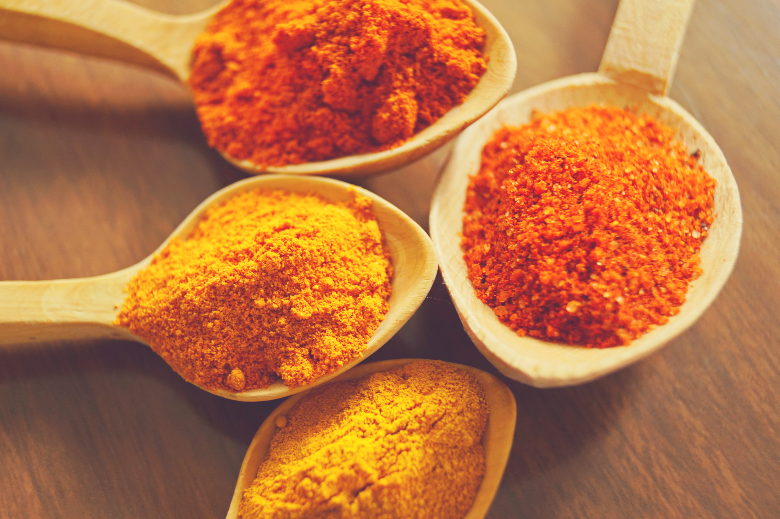I never knew of the health benefits of turmeric. For years, I suffered from gastrointestinal problems that just wouldn’t let up. Day after day I would be searching for something to ease my stomach pain and better my quality of life.
If I didn’t find something soon, I’d continue to suffer and end up missing out on the important things in life, like my children’s birthdays or friend’s weddings. Eventually, after trying medication, I turned to natural supplements to help improve my pains, and that’s when I found turmeric.

What is Turmeric?
Surprisingly, most people have a little jar of this stuff in their spice cabinet and they don’t even know it!
Turmeric is a yellow spice used in some ancient medicinal practices to improve overall health and digestion. medicines since ancient times, this spice is somewhat of a cousin to ginger, another well-known medicinal plant that prevents nausea.
While turmeric is not known to prevent or dispel nausea like its cousin, it is known to assist in gastrointestinal problems, as well as other common inflammatory troubles in the body.
The spice itself comes from the dried roots of the turmeric plant, rather than the above ground plant. Turmeric is generally found in India and other Southern Asian countries, and gives the dish known as curry its unique color and flavor.
Different Forms of Turmeric
Fresh Turmeric Root
This version of turmeric is used in cooking, as well as eaten raw. Most suggest using a small amount of the root when cooking, being as it is bitter and can overpower other flavors, and an even smaller piece of the root to chew on by itself. Fresh turmeric root has been used in dishes using rice, pasta, broths, and even smoothies.
Ground Turmeric
Ground turmeric, the most common of the types of turmeric, is a dried powder of the turmeric root that has been ground for easier use in cooking. This version of the root can be used in nearly anything, including eggs, curry, and soups.
Most importantly, however, this version can be used to make turmeric tea, a liquid version of the spice that is easy to drink. Ground turmeric can also be used as a topical treatment when mixed with other ingredients. This topical treatment can help with skin inflammation.
Turmeric Supplements
Turmeric supplements are just like other supplements we may know, including Vitamin C or multivitamins. These supplements are put into a pill casing to make turmeric easily digestible and less pesky to work with than raw turmeric. Supplements usually come in a variety of sizes with the most common being 500mg of turmeric per pill.
Why Turmeric?
Turmeric has been used in medicines since ancient times, and is still used in many countries today. Health professionals have found there is a link to the overall cellular level health of an individual and their intake of the turmeric spice.
Unlike some modern medicines and supplements, turmeric does not have adverse side effects when taken in certain amounts. In fact, there is no proven amount of turmeric that is believed to be “too much,” as no amount has caused a reaction (in an individual not taking other medications) as far as anyone is concerned.
Benefits of Turmeric
Health professionals, both of modern and ancient practices, have found a connection with turmeric to a multitude of health solutions, which is why the spice has been used for such a long amount of time in human history.
While the turmeric root is not a catch-all curing agent that can miraculously heal any disease, it can assist in dulling the effects of some ailments. The main component of turmeric that is helpful for many health problems is curcumin, which is what makes the turmeric its iconic yellow color.
Some people might call turmeric a “natural painkiller,” so put aside those bottles of painkillers because this spice is taking their place in your medicine cabinet.
Turmeric is proven to reduce inflammation, which makes it perfect for diseases like irritable bowel syndrome (IBS), chronic migraines, and arthritis. Rather than seeking a pain pill, turmeric might be a better, safer option for those who don’t want to deal with the long-term side affects of anti-inflammatories like acetaminophen.
Along with its anti-inflammatory properties, turmeric is also known to have cell-boosting particles in it that help to prevent cell mutations that may cause cancer and Alzheimer’s disease.
While this doesn’t mean turmeric is the cure to these horrible diseases, it does mean that it can be used as a preventative measure for them. In fact, scientists and doctors have been working to use turmeric as a method of preventing, as well as treating cancer.
Another health benefit of turmeric is that it is known to burn fat cells and lower cholesterol through the help of its trusted side-kick: curcumin. This is helpful to those who have trouble with their weight, as it helps prevent things like heart disease.
On top of those two weight-related benefits, turmeric will also help burn the fat, as well as keep it off of the body for an extended amount of time.
Are you also looking for more items to help put antioxidants in your body? Well, you’re in luck, because turmeric does that as well.
This means that turmeric is useful in stopping harmful oxidizing components from reacting in the body, which causes things like aging and some disease. The curcumin in turmeric is an amazing antioxidant that many people would find beneficial to add to their diets.
Shopping For Turmeric
Fresh Turmeric Root
As with most fresh produce, turmeric root will go bad after a certain amount of time. It is important to keep this in mind when purchasing the root so as to find the best suited for your needs. When purchasing your fresh turmeric, be sure to purchase at a trusted specially grocery store that has trustworthy produce.
Turmeric root can and should be kept in the fridge in the produce drawer. To keep it as fresh as possible, put it in a paper towel and then place the wrapped turmeric root into a plastic bag. This will keep it from going bad as quickly, and also prevent it from spreading its flavor to other produce in the drawer.
Now, mold might be scary to some, and many will throw away any produce that begins to grow it. Luckily, turmeric can mold and still be used, so long as the moldy section of the turmeric is cut off and the paper towel and bag it is being held in is replaced. When kept this way, turmeric root can be kept fresh for up to a week.
Ground Turmeric
Ground turmeric can be found in nearly all grocery stores that have a spice section. It comes in small jars, and can be purchased with little to no concern. This type of turmeric will hardly last long enough to expire, but if it is kept on the shelf for four years or more, it may be time to toss it.
Turmeric Supplements
Supplements can be one of the most difficult things to shop for. I, myself, have had trouble with getting certain supplements due to the vast variety of dosages when it comes to them. What might be the right dose for one person may not be enough for another, or vice versa.
The thing to seek out when shopping for turmeric supplements, however, is not the dosage in accordance to turmeric itself, but is actually the amount of curcumin in the supplement. The more curcumin percentage in the supplement, the better it will be in regards to the health benefits of turmeric.
Another thing to keep in mind when purchasing any supplement is to make sure the ingredients are non-GMO and all-natural. These will be the best ingredients for your body.

How to Use Turmeric
Fresh Turmeric Root
Fresh turmeric root is one of the best ways to obtain the benefits of turmeric in the diet, but it is also one of the most difficult due to the amount of work needed to prep it. There are many recipes for cooked and raw meals that use turmeric, and there are also other ways to use the root for any of the benefits mentioned before.
Turmeric root can be sliced, grated, or pureed to make a multitude of things. When using sliced turmeric root, it is best to cook it in something like a soup or stew to dull the flavor slightly, so as to not overpower the palette. When grated, turmeric is a great addition to any egg omelette or chicken salad.
If the taste of turmeric isn’t necessarily appealing, a small chunk of turmeric can be ground up and added to a smoothie, or a butter that can be used in cooking later. Pureed turmeric can also be placed in a salve or cream to use topically. All of these methods will add the needed turmeric to your diet.
Ground Turmeric
Ground turmeric is a little less versatile in the manor of textures available, but it is no less useful to keep in your pantry. When kept in a spice cabinet, ground turmeric will not spoil as quickly as fresh turmeric root.
One of the best uses for powdered turmeric is as a crusting for vegetables and meats. While this does not mask the flavor for those who dislike it, it is a great method for those who enjoy the taste. Rolling the meats or vegetables in the turmeric is a great way to coat them, but also placing the turmeric in a mixture of breadcrumbs is a good option as well. This breadcrumb mixture can be used for breading, as well as in burgers or meatballs to spice up the flavors.
Another way to use ground turmeric is to mix it in a tea. Teas have been used for centuries for all sorts of ailments, and turmeric tea is no exception to this. Turmeric mixed with hot water is excellent for easing stomach pains due to gastrointestinal trouble or cramps, as the hot water assists in the anti-inflammatory properties of the turmeric.
Ground turmeric can also be used in similar ways to the raw root. One can put it in chicken or tuna salad, or in an omelette, as the spice can be used in a similar way to that of salt and pepper.
Turmeric Supplements
Turmeric supplements are a great way to easily get turmeric into your diet without the need to prep produce or cook. Supplements are great for busier people, but there is some caution required when taking them.
While there are no side effects directly linked to turmeric supplements, it is still a spice that can affect the digestive system and body in various ways. These effects can be different from person to person.
Be sure to look at the amount of turmeric in each supplement, and do not take more than directed on the box or by a health professional. Supplements can be taken by mouth, with water or other liquid, or they can be taken without liquid to wash them down.
Be sure to check with your doctor or medical provider about other medications you may be taking with turmeric. Some medications have been linked with adverse side effects to turmeric, such as the thinning of the blood. For more information, ask your doctor.
Summary
Turmeric is one of the best things out there to help you get back to your normal self with all-natural ingredients. It can help inflammation caused by a multitude of things, and it can also help you lose weight and regulate cholesterol, helping to prevent diseases like heart disease and diabetes. This little root can go a long way, and you won’t regret introducing it into your routine.



